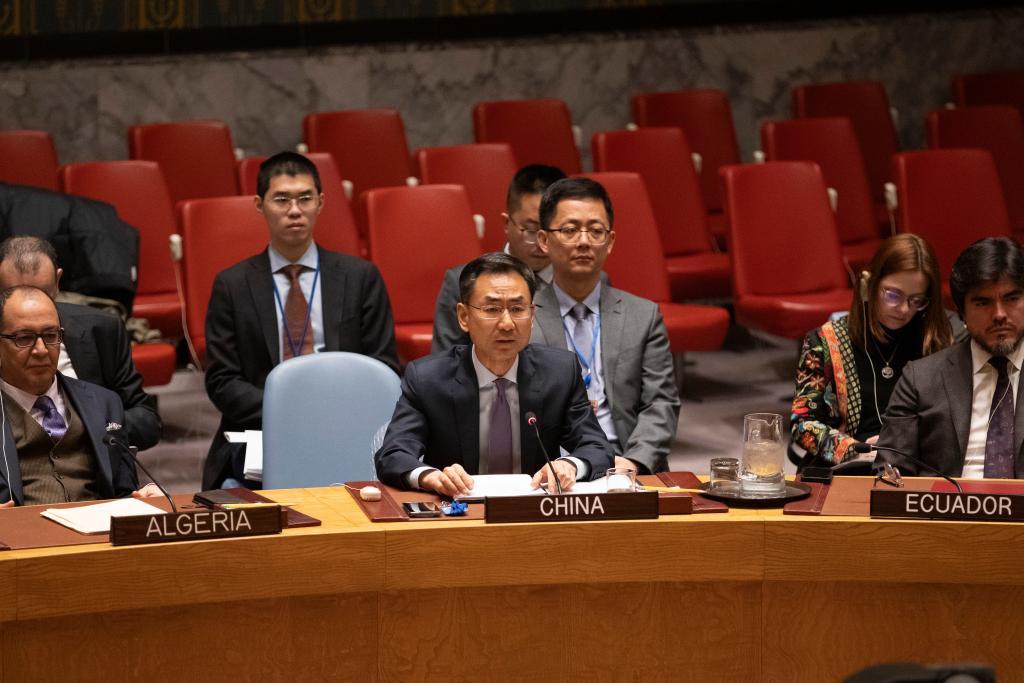
Geng Shuang (C, front), China's deputy permanent representative to the United Nations, speaks in an explanation of vote after the Security Council voted on a draft resolution extending the mandate of the Panel of Experts assisting the Democratic People's Republic of Korea (DPRK) Sanctions Committee, at the UN headquarters in New York, on March 28, 2024.(Xinhua/Xie E)
UNITED NATIONS, March 28 (Xinhua) -- A Chinese envoy on Thursday warned against the tightening of sanctions against the Democratic People's Republic of Korea (DPRK).
The current situation on the Korean Peninsula is characterized by persistent tensions and growing confrontation, which serves no one's interests. This is the last thing China wants to see, said Geng Shuang, China's deputy permanent representative to the United Nations.
The settlement of the issue cannot be divorced from political mutual trust and a favorable climate. Blindly increasing sanctions and highlighting pressure will not help resolve issues. It will only be counterproductive. Indulging in military alliances and obsession with military confrontation will only further exacerbate antagonism and tensions, making the goal of denuclearizing the Korean Peninsula and maintaining its peace and stability even more elusive, he said.
"China once again calls on all parties to adopt a rational and pragmatic approach, stay committed to political settlement, resume contacts, build mutual trust, restart dialogue as soon as possible, and do more for peace and stability on the peninsula. The international community, including the Security Council, should also create a favorable environment to this end," he said in an explanation of vote after the Security Council voted on a draft resolution extending the mandate of the Panel of Experts assisting the Democratic People's Republic of Korea (DPRK) Sanctions Committee.
Russia vetoed the draft resolution tabled by the United States.
China has always maintained that sanctions are not an end in itself, but a means. Sanctions against the DPRK should serve the denuclearization of the peninsula, the launch of dialogue and negotiations among the parties, and the final political settlement to the peninsula issue, said Geng.
It is concerning that the harsh sanctions against the DPRK have exacerbated tensions and confrontation with a serious negative impact on the humanitarian situation and livelihoods on the ground, he said.
China has participated constructively in the consultations on the U.S. draft. China highly appreciates and supports the Russian proposal to set a time limit for the DPRK sanctions and conduct periodic reviews. China believes that this proposal, if adopted, will be a great improvement to the sanctions regime and would give impetus to break the current deadlock in the situation. Regrettably, the Russia proposal has not been taken on board, said Geng.
When the mandate of the Panel of Experts is yet to expire and when parties still have time for consultations, the draft resolution has been forced to a vote. China had to abstain, he said.
China's position on the Korean Peninsula issue is crystal clear. China has always been committed to maintaining peace and stability on the peninsula, to advancing in parallel the denuclearization of the peninsula and the establishment of a peace mechanism, and to resolving issues through dialogue and consultation, he said.
As a close neighbor of the DPRK, China will continue to actively maintain stability and promote talks, and play a constructive role in advancing the political settlement, the early resumption of dialogue, and the realization of long-term peace and stability in Northeast Asia, said Geng. ■



